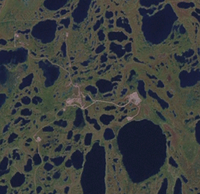 Complex seen from Landsat 7 in June 2013 Complex seen from Landsat 7 in June 2013 | |
| Location | Near Churchill, Manitoba |
|---|---|
| Coordinates | 58°44′03″N 93°49′13″W / 58.73417°N 93.82028°W / 58.73417; -93.82028 |
| Short name | Fort Churchill |
| Operator | Defence Research Board (1954-1958) United States Army (1959-1970) National Research Council (1970-1989) Akjuit Aerospace (1994-1998) |
| Total launches | 3,500 |
| Launch pad(s) | 4 |
| National Historic Site of Canada | |
| Official name | Churchill Rocket Research Range National Historic Site of Canada |
| Designated | 1988 |
The Churchill Rocket Research Range is a Canadian former rocket launch site located 23 kilometres (14 mi) outside Churchill, Manitoba. The facility was used by Canada and the United States beginning in 1954 for sub-orbital launches of sounding rockets to study the upper atmosphere. The site was scientifically beneficial due to lying in the center of a zone containing high aurora activity. Over 3,500 sub-orbital flights were launched from the site.
The site is sometimes referred to as Fort Churchill after the nearby former military base (now Churchill Airport) and is connected by an all-weather gravel road to the town of Churchill.
History

The complex was first built in 1954 by the Canadian Army's Defence Research Board to study the effects of auroras on long distance communications. The programme shut down in 1955, but the site was re-opened and greatly expanded in 1956 as part of Canada's participation in the International Geophysical Year. Launches for the IGY experiments started in 1957, and the site was closed again in December 1958 when the IGY, which was actually two years long, ended.
The site was reopened again in August 1959 by the US Army, in collaboration with the Canadian government, as part of its network of sounding rocket stations. In September 1959 it was used to test CARDE's new solid fuel propellant systems with PVT-1, the vehicle that would evolve into the Black Brant. However, in late 1960 a fire destroyed many of the facilities. It was announced that the Black Brant test series would be continued with an additional twelve launches at NASA's Wallops Flight Facility during 1961-62, while the facilities at Churchill were rebuilt.
The US Army ended its involvement at Churchill in June 1970, and the site was taken over by the Canadian National Research Council to support the Canadian Upper Atmosphere Research Program. The site was used sporadically during the 1970s and 1980s, and was largely deserted by 1985.
SpacePort Canada: 1994-1998
Akjuit Aerospace, a Canadian company founded in 1992, signed a 30-year lease with the Canadian government for the Churchill Rocket Research Range in 1994 with the goal of developing the world's first commercial spaceport. Akjuit assembled a "technical team" of 21 firms led by the American aerospace contractor Raytheon to plan the development of the site into SpacePort Canada, including polar orbital launch capability. Akjuit planned to launch commercial polar-orbiting payloads using Russian-made Start-1 rockets (so named as they were made of repurposed Soviet-era SS-25 ICBMs made redundant by the Strategic Arms Reduction Treaty). Churchill's location in the western hemisphere combined with its range-safety for firing northwards made it an ideal location, with the exception of the extremely cold weather which would limit launch seasons.
Akjuit's first and only rocket launch took place at 7:10 a.m. Central Time on April 28, 1998: a suborbital Black Brant IXB research rocket containing a physics payload for the Canadian Space Agency.
Akjuit Aerospace ceased operations in May 1998.
Current uses

The site is no longer used for rocket launches and is currently the location of the Churchill Northern Studies Centre, a non-profit and multi-disciplinary research facility that is also open for educational tourism.
References
- ^ Kives, Bartley (July 26, 2011). "Visitors safe in Churchill's new centre". Winnipeg Free Press. Retrieved March 26, 2017.
The centre, located at a former rocket range about 23 kilometres east of the town of Churchill, has offered research space to scientists and education programs to travellers since 1976.
- "Churchill Rocket Research Range National Historic Site of Canada". Canadian Register of Historic Places. Parks Canada. Retrieved March 26, 2017.
- Godefroy, Andrew B. (2011). Defence & Discovery: Canada's Military Space Program, 1945-74. Vancouver, B.C.: UBC Press. p. 41. ISBN 978-0-7748-1959-6.
- CSA - Fort Churchill – a landmark in Canadian space research Archived 2011-07-04 at the Wayback Machine
- ^ Braga, Matthew (September 25, 2014). "Before Mojave There Was A Subarctic Spaceport in Canada". Motherboard. Retrieved 2016-04-15.
- Interfax (January 24, 1998). "Agreement Reached To Launch Satellites From Canada". News. Federation of American Scientists. Archived from the original on February 8, 2001. Retrieved December 10, 2017.
- "SpacePort Canada, the world's first privately owned spaceport, launches rocket" (Press release). Winnipeg, Manitoba: Akjuit Aerospace. April 28, 1998. Archived from the original on May 26, 1998. Retrieved December 10, 2017.
External links
| Spaceports | |||||||||||||
|---|---|---|---|---|---|---|---|---|---|---|---|---|---|
| Active |
| ||||||||||||
| Proposed |
| ||||||||||||
| Historical |
| ||||||||||||
| Canadian Space Agency | |||||
|---|---|---|---|---|---|
| Canadian astronauts |
| ||||
| Satellites | |||||
| Other space technology | |||||
| Facilities | |||||
| Contractors | |||||
| Related institutions | |||||
| International partners | |||||
| Other | |||||
| National Historic Sites of Canada by location | |
|---|---|
| Provinces | |
| Territories | |
| Other countries | |
- 1954 establishments in Manitoba
- 1998 disestablishments in Manitoba
- Buildings and structures on the National Historic Sites of Canada register
- Military research installations of Canada
- National Historic Sites in Manitoba
- National Research Council (Canada)
- Rocket launch sites in Canada
- Space program of Canada
- Spaceports
- Former research facilities of the United States Army
- Buildings and structures in Churchill, Manitoba
- Science and technology in Manitoba